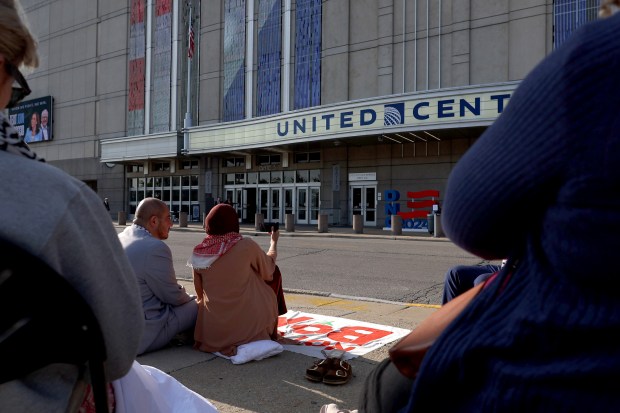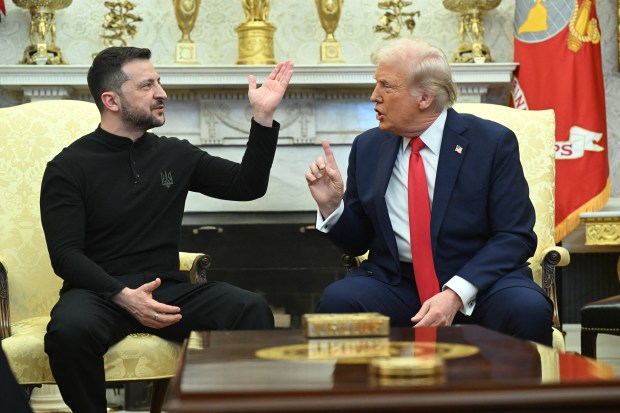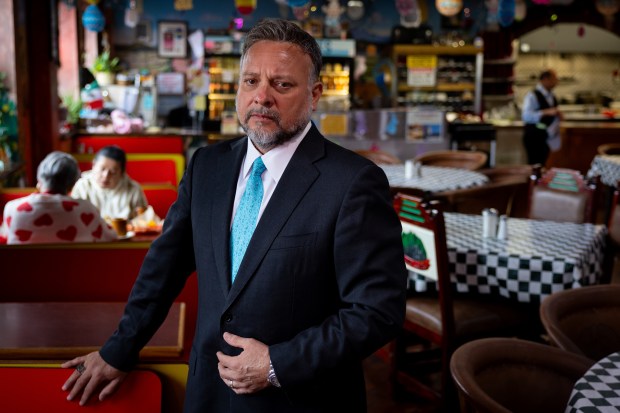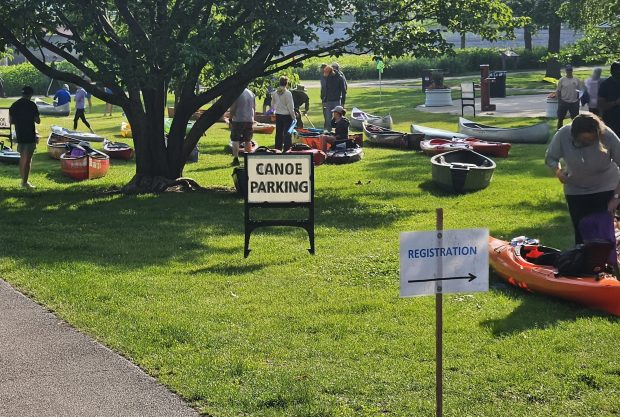After more than four decades working in the paper industry, Gaetano “Guy” Spinelli poured his life savings into developing an eco-friendly yet durable paper straw and opened his company, Boss Straw, in Woodstock in 2021.
Then in February, President Donald Trump signed an executive order promoting plastic straws while declaring that paper straws “don’t work.”
“I’ve had them many times. On occasion they break. They explode,” Trump said. “If something’s hot, they don’t last very long, like a matter of minutes, sometimes a matter of seconds. It’s a ridiculous situation.”
The president’s rant incensed Spinelli, who had voted for Trump in November. Business immediately dropped following the executive order.
“He’s put me from a profitable picture to a nonprofitable company,” Spinelli said. “And my product is a strong product. I’ve got a paper straw that lasts two weeks in any drink, hot or cold,” without compromising taste.
Despite the recent hit to his company, the 75-year-old business owner said that if he could go back, he would still cast a ballot for Trump in the 2024 presidential election.
“Outside of what he did to me, I think he’s doing a pretty good job,” Spinelli said.
As Trump approaches 100 days in office, the Tribune interviewed voters who supported the president in November to gauge their opinion on the whirlwind first few months of his second term — from a flurry of more than 120 executive orders and controversial immigration crackdowns to deep federal government cuts and so-far failed attempts at peacemaking.
Several national polls recently showed a dip in Trump’s approval rating: An Economist/YouGov poll released Wednesday found 41% of Americans approved of Trump’s job as president and 54% disapproved, down from 42% approval and 52% disapproval the week prior; the president’s managing of the economy was a gripe for many surveyed.
But like Spinelli, most Trump voters interviewed praised the administration’s work so far. Even those who disagreed with some of the president’s rhetoric or policies did not regret their vote, arguing that Trump was still the best option on the ballot.
A Muslim voter felt Trump did a good job during his first term, “so I wanted him to continue on the course we were on before.”
A Ukrainian American criticized Trump’s understanding of Russia’s war against his homeland, but doesn’t believe opponent and former Vice President Kamala Harris would have done a better job.
Two Mexican American voters said they still support the president, even after the administration launched a blitz of Immigration and Customs Enforcement raids, with the Chicago area serving as a prime target.
The DuPage County Republican chairman, who has in the past been critical of Trump’s negative impact on local elections, said the president is off to a good start because, “by and large, we’re getting what he promised: sweeping change.”
In general, voters don’t tend to regret their ballot choices this soon after an election, said Matt Grossmann, director of the Institute for Public Policy and Social Research at Michigan State University.
Newly-elected presidents often experience a honeymoon period of sorts, with favorability ratings typically highest at inauguration and “going down from there,” Grossmann said.
A rise in negative partisanship can also reaffirm a voter’s choice over an opposing candidate.
“People don’t rate their own party any more favorably than they have in the past, but they rate the opposition party more negatively,” said Grossmann, author of the 2024 book “Polarized by Degrees: How the Diploma Divide and the Culture War Transformed American Politics.” “So that just means more people are going to be voting against something rather than voting in favor of something.”
Maintaining voter support in the long run can be much more difficult, for any president, Grossmann said.
Public opinion tends to be thermostatic, which means preferences shift against the direction of policymaking, typically swaying more liberal during a conservative administration and vice versa, he said.
“There also seems to be a movement against the party of the president that’s somewhat independent of policies,” he added.
As for Spinelli, he lauded Trump as the first president in his lifetime “who’s delivered on what he’s promised.”
The Boss Straw CEO said he favors the administration’s recent federal government cuts, tariffs on foreign goods and immigration policy.

Spinelli also expressed strong dislike for Harris and her running mate, Tim Walz; had the presidential candidate been Pennsylvania Gov. Josh Shapiro instead, Spinelli said he might have voted Democrat.
Following Trump’s pro–plastic straw order, Spinelli sent five letters and a dozen emails to the White House urging the president to try his product.
So far, he’s received no response.
“I even sent him a box of straws,” Spinelli added.
No empathy from the Democratic Party
During Trump’s first presidency, Dr. Naveed Sadiq noticed his patients and fellow community members in downstate Danville — many of them blue-collar workers — were doing pretty well financially.
“People were buying Harley-Davidson motorcycles and ATVs and jet skis,” said Sadiq, who recently moved to Florida but still owns property in Illinois. “Things like that, that were luxury items for those people.”
After President Joe Biden came into office, that prosperity seemed to dwindle, the physician said.
“Economically, I’m more into lower taxes and … if you work more, keep more of what you make,” he added.
In 2017, demonstrators filled airports across the country, including O’Hare International Airport, to decry the Trump administration’s travel ban, which barred entry into the United States from seven predominantly Muslim countries. During the recent campaign, Trump vowed to bring back and expand the ban to prohibit refugees from Gaza.
Sadiq, a Muslim who was born in Pakistan and came to the United States at the age of 2, said he has safety concerns about any travelers entering the country who aren’t properly scrutinized.
“If there’s a country that they’re coming from that doesn’t have a stable government and can’t vet them, or we can’t vet them because we don’t have data, then I don’t think they should just be able to come without knowing who’s coming,” he said.
In terms of foreign policy, he said he sees Trump as a truly anti-war president who will do his best to bring peace overseas, particularly in the Middle East; Sadiq pointed to the signing of the Abraham Accords — a series of bilateral normalization agreements between Israel and several Arab countries — during Trump’s first term.
Many Muslim and Arab American voters in Illinois and across the country reported feeling dissatisfied by the Democratic Party during the presidential campaign, citing Democrat support for Israel in the war in Gaza.
This sentiment culminated over the summer with the Democratic National Convention in Chicago, where no pro-Palestinian voice was given a platform, said Faye Nemer, founder and CEO of the Middle Eastern and North African American Chamber of Commerce.
“We pretty much gave the Democratic Party many opportunities to reclaim their position within the Arab American and Muslim American community,” she said.

Nemer, who was born in Lebanon and had been a loyal Democrat, instead voted for Trump, who penned a letter in late October to the Lebanese American community pledging a commitment to peace in Lebanon and the rest of the Middle East. A few days before the election, Trump met with Arab American leaders in Dearborn, Michigan, the nation’s biggest Arab-majority city, where Nemer resides.
But she grew alarmed in February, when Trump proposed the evacuation of millions of Palestinians from Gaza, with plans to turn it into a “Riviera of the Middle East.” In March, Trump shared an AI-generated video depicting “Trump Gaza,” featuring him and Israeli Prime Minister Benjamin Netanyahu sunbathing together.
The Trump administration has also targeted college campus protesters who demonstrate against Israel and the war, threatening some with deportation. But on Friday, the government reversed course on student visa terminations amid a barrage of legal challenges to the policy.
“Our freedom of expression, freedom of demonstration and just overall liberties are at stake,” she said.
Yet even in hindsight, Nemer doesn’t think she could have voted differently.
“We weren’t getting that empathy from the Democratic Party, unfortunately,” she said. “But Republicans are almost making the same mistake now.”
The fate of Ukraine
As Russian missiles rained on Ukraine in February 2022, Biden unequivocally condemned the unprovoked attack.
“When the history of this era is written, Putin’s choice to make a totally unjustifiable war on Ukraine will have left Russia weaker and the rest of the world stronger,” he said.
The United States appropriated or otherwise made available around $180 billion in aid for Ukraine since the full-scale invasion. But shipments of weapons were stalled by internal debates within the Biden administration over the possibility of Russian escalation — delays that Alik Kasman of Buffalo Grove believes proved debilitating for the military of the nation of his birth.
“President Biden … understands, or seemed to understand, the nature of the war. He committed to helping Ukraine,” said Kasman, an activist for military aid for Ukraine, who was born in Kyiv. “However, we have seen that his material support, actual weapons transfer to Ukraine, were not nearly sufficient.”
Moscow was counting on a quick victory and not ready for prolonged resistance; if Ukraine had immediately received everything Congress allocated, Kasman contends that “the war could have been finished.”
During the 2024 presidential race, Kasman didn’t see any good options for Ukraine on the ballot. He voted for Trump, hoping for a change in the status quo.
“Kamala Harris did not indicate that she would do anything different than President Biden would have … a cautious supply of weapons that would prolong the war but would not lead to any decisive outcome.,” he added.
In February, Trump called Ukrainian President Volodymyr Zelenskyy a “dictator” while falsely claiming he started the war. During a contentious White House meeting later that month, Trump berated Zelenskyy and declared himself “in the middle” and not either the side of Ukraine or Russia in the war.

Then on Wednesday, Trump castigated the Ukrainian president on social media for his refusal to cede Crimea to Russia as part of a possible peace plan. On Thursday, he criticized Russian President Vladimir Putin for bombing Ukraine, posting “Vladmir, STOP!,” on Truth Social.
“(Trump) doesn’t understand this war. He’s trying to view it as a civil dispute between two parties where each can agree to some concessions and meet in the middle and settle for whatever both can agree to,” said Kasman, adding that Moscow’s aggression won’t stop with Ukraine, putting other nations at risk and threatening world order.
Kasman said he is not happy with Trump. But he doesn’t believe the alternative would have been better.
“As an advocate for Ukraine, it is much easier to deal with Trump because I can go to (Washington, D.C.) and I can contradict his point of view,” he said. “Whereas with Biden, that was a much more difficult task. I had to go and explain why I believe Biden is saying one thing and doing something else.”
The vote of punishment
A few days after the election, J. Marcos Peterson wrote a Chicago Tribune letter to the editor explaining why he — a self-described gay, first-generation Mexican American with family members in the U.S. without legal permission — voted for Trump.
The letter took Democrats to task for failing to build coalitions, botching the economy and mishandling the southern border. The opinion piece also expressed ire at the Biden administration’s fast-tracked work permits and other assistance for recently-arrived migrants.
“Seeing my undocumented family members, who have been in the U.S. for more than 20 years, work, pay taxes and buy their own homes with zero benefits, then watching millions of new migrants skip the line with government funded help, only enflamed me and other Latinos like me,” he said in the letter.
As the first hundred days of Trump’s second term come to a close, Peterson said he’s been generally pleased.
“Everything he promised to do, he’s doing,” Peterson said during a phone interview.
There are some aspects Peterson disagrees with, such as Trump granting clemency for more than 1,500 people charged with crimes in the Jan. 6, 2021, insurrection at the U.S. Capitol.
But the Lincoln Park resident said he appreciates the president’s otherwise hard-line stance on public safety and Elon Musk’s Department of Government Efficiency, which has made headlines for its spending cuts and mass firings. Peterson noted that the private sector workers often face layoffs.
Just after inauguration, the Trump administration launched ICE raids around the country, with the Chicago area serving as ground zero. Executive orders also rolled back several Biden administration immigration policies, including one that limited deportation priorities to those accused of major crimes or deemed a national security risk.
Many local residents in the country without legal status were afraid to leave their homes or send their children to school amid the threat of mass deportations. ICE has repeatedly refused to say how many migrants have been detained in the Chicago area since January.
Peterson said that fear was “stoked by the left.”
“What was the whole campaign for Kamala Harris? The constitution, the whole republic of America is going to end with Donald Trump and you’re going to not be able to live your life,” he said. “Everything was fear, because they didn’t have any policies to bring up.”
In a Tribune article in January, Sam Sanchez — a Mexican American restaurant owner in Chicago and immigration advocate — described increasing frustration as the Biden administration granted expedited work permits to newly arrived migrants, primarily from Venezuela, while some of his employees, in the U.S. without legal permission, who had been here for decades continued to go without.

Sanchez and other Latino leaders shifted their support to Trump, with a focus on border security and bipartisan immigration reform, citing Democratic inaction on both fronts.
“We’re asking for work visas — like Biden did, he found a way to do it — for long-term (undocumented workers),” Sanchez said during a recent phone interview.
Trump took 43% of the Latino vote in 2024, a jump from 35% in 2020, though more than half of Latino voters supported Harris in 2024, according to The Associated Press.
Sanchez described the rise in Latinos voting Republican as “el voto de castigo,” or a punishment vote, against Democrats, adding that the poor economy was another major issue of contention.
“The Latino vote is not owned by Republicans or Democrats,” he said. “If they help us, they get our vote. If they don’t help us, then the vote goes to a different place. That is the way it should be.”
Sanchez, who owns Moe’s Cantina and other restaurants, said he continues to back Trump.
But he warns Republicans that the Latino vote “is still vulnerable.”
“It’s up to the Republicans to maintain that vote and grow it,” he said. “Or it’s up to the Democrats to gain it.”
Rise of extremism, polarization
Kevin Coyne, chairman of the DuPage County GOP, predicts the 47th president will have a successful term.
“Trump is taking enormous steps at downsizing the size of our government,” he said. “He is taking enormous steps toward making America first in the global economy.”
Although the local Republican leader supported Florida Gov. Ron DeSantis during the 2024 presidential primary, Coyne said he and most Republicans soon realized “that a freight train level of support and energy” surrounded Trump’s candidacy.
In the past, Coyne has raised concerns about Trump’s effect on local elections in DuPage County, a longtime Republican stronghold where Democrats have taken control in recent years. .
“What I’ve said is that Trump is certainly a very controversial figure here in DuPage County and I think he certainly added an issue for Republicans to work through in DuPage,” he said. “ So I think, politically, he has been somewhat of a problem from time to time for Republicans.”
Across suburban Chicago, local Republicans suffered major election losses in April, a blue wave many have attributed in part to backlash against the Trump administration.
Yet Coyne said he was relieved when Trump won in November, calling Harris-Walz “possibly the worst presidential ticket we’ve seen in 50 years.”
“It was a poorly executed campaign on many levels,” he said. “Trump, whether you hate him or love him, he’s the best showman we’ve seen in politics for a very, very long time.”
The president has also been masterful at manipulating the media, Coyne added.
“He does these things endlessly that he knows are going to be grabbed and circulated on every media outlet in the world, which gives him ubiquitous political presence and makes him extremely formidable,” Coyne said.
While the former Naperville city councilman said he supports many of Trump’s policies, he would also prefer a return to a more “Reagan-style of Republican politics.”
“I do think you can be respectful … and still be a strong leader,” he said.
Coyne added that a growing political extremism on both the right and left should trouble all Americans. Gerrymandering, political primaries, cable news and the rise of social media have contributed to this state of polarization, he said.
More middle-of-the-road candidates have a harder time winning; moderate voters tend to be repelled by the nastiness and not get involved, Coyne said. When average voters check out of the political process, that can strengthen the role of more extreme voices, spurring a vicious cycle, he added.
He hopes this climate will soon shift.
“Political pendulums swing. Things change over time,” he said. “But moderate people need to reengage in politics at a much greater clip.”
eleventis@chicagotribune.com




